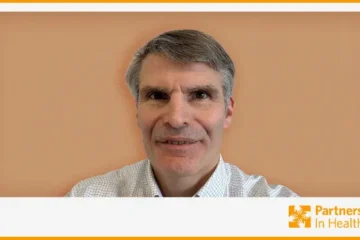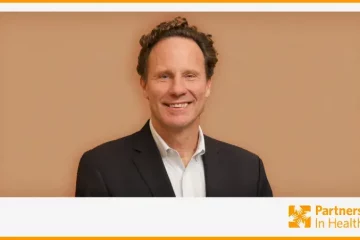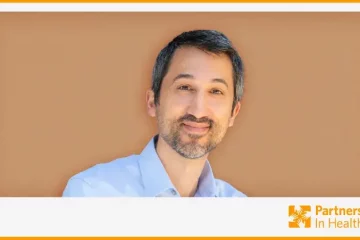Regan Marsh: “A Crisis of Compassion”


Regan Marsh—senior strategic advisor at the Brigham and Women’s Hospital and former director of clinical systems at PIH—wrote this reflection following the death of Paul Farmer:
In thinking about what I would say today, I found myself wanting to hear Paul’s voice, and so on Tuesday night, I sat down to tearfully rewatch Bending the Arc. Early in the movie, as Paul talks about the needless deaths of three patients from TB, Paul states simply: “This provoked a crisis.”
I’ve been thinking about these words a lot: “This provoked a crisis.” How Paul’s love for each person, each patient, was so deep that it could provoke a crisis. A crisis of love, a crisis of compassion, a crisis both deeply about the person and yet strong enough it could build systems and drive this incredible movement.
I had the great honor of seeing many patients with Paul, often in the early months of Mirebalais Hospital’s opening. In July 2013, Mirebalais had been open only for a month when we saw our first major trauma. A taptap rolled over and our new ER received 14 patients all at once.
In the middle of this trauma, Paul walked in. We didn’t know he was coming, as usual with Paul. Paul always liked to enter HUM through the ER. He said he liked to see the team and the work in action. I think he also liked that the ER door is closest to the parking lot and he could sneak into the hospital.
Paul then did what he always did. He talked to all of the patients. He looked at CT scans with us. He spoke at length with an 80 year old man who needed a urinary catheter. He learned that after multiple visits to multiple hospitals, his family had brought him to HUM to get care. For years afterward, Paul asked me about how he was doing…because that’s how Paul was. There was no momentary interaction. There were only enduring connections.
I think Paul saw all gaps in care as a crisis—a signal of his deep belief in everyone’s right to health.
For this reason, Paul pushed us to build Mirebalais after the 2010 earthquake. And to ensure that it was a teaching hospital, an academic medical center, a beacon, where people from across the country could get the care they deserved and where generations of Haitian physicians and nurses could become specialists and leaders in their fields. This vision led to the creation of the residency and nursing training programs at Mirebalais to close these gaps. It was this same recognition of these gaps that led to our work in Sierra Leone and Liberia during Ebola, the creation of UGHE and so much more of which we are so proud.
I’ve been reflecting on the lessons from Paul. There are so, so many, but for myself, I’ve been thinking about three in particular.
First, Paul as our visionary. He was ambitious about what must—and can—be done. He refused to be constrained by people’s lack of imagination. In making everyone a bit nervous with his vision, we achieved things that we were told weren’t possible. He told all of us to do what was needed, and that we would sort out the details later.
Second, Paul as a gardener. Paul loved his plants and brought them to every PIH site, leaving us all to anxiously tend them, knowing that he would expect them to be alive when he returned. One day, our team had to frantically orchestrate a fish rescue, worrying that Paul would be mad, after someone did their laundry in the koi pond. Paul’s attention to gardens speaks to his commitment to hope and optimism. You plant gardens when you intend to be there for years. Gardens bring dignity, and transform hospitals and clinics into places of healing.
Lastly, Paul as a teacher. I saw Paul describe himself as this one time in Haiti. There was a crowd around him, as there tended to be, and an older woman asked him who he was. He replied simply that he was a ‘teacher, a professor.’ I’ve thought of that often. Paul’s light shone so bright when he was with students, on rounds or in class. He taught us both formally but also in little ways, pushing us to be better, more compassionate, more ambitious, not to feel constrained, to demand more, and to expect more.
The last patient that I took care of with Paul was a 12 year old boy named Etienne. Etienne had been injured in the recent earthquake in August in Haiti. Paul ensured that Etienne had everything he needed, from his favorite juice and cookies to a cell phone. And after Paul returned to Miami, he called me at all times of day and night to check in on Etienne.
I marveled at how much Mirebalais had grown from that first taptap accident to Etienne’s arrival—the interval between two devastating earthquakes. When Paul brought Etienne to HUM, he was met by an incredibly capable ER team, surgical team, orthopedic team. Many of whom trained at Mirebalais and now are accomplished attendings and senior nurse leaders. The hospital bustled with medical students, more trainees, and even more patients. I know Paul was proud. He said we should build a Mirebalais in the south. But he also wasn’t satisfied. He pushed us to make HUM even better for Etienne and everyone else, ensuring there are no gaps, showing his deep love for everyone, so that all of our patients have the highest level of health care. Whether they are in Haiti, Rwanda, Sierra Leone, Liberia, here in Boston or anywhere in the world.
I want to end with a quote from William Stafford, which Paul gave to us as the epigraph from Fevers, Feuds and Diamonds. Perhaps he knew we would need it.
There’s a thread you follow. It goes among
things that change. But it doesn’t change.
People wonder about what you are pursuing.
You have to explain about the thread.
But it is hard for others to see.
While you hold it you can’t get lost.
Tragedies happen; people get hurt
or die; and you suffer and get old.
Nothing you do can stop time’s unfolding.
You don’t ever let go of the thread.
– William Stafford, 1993



